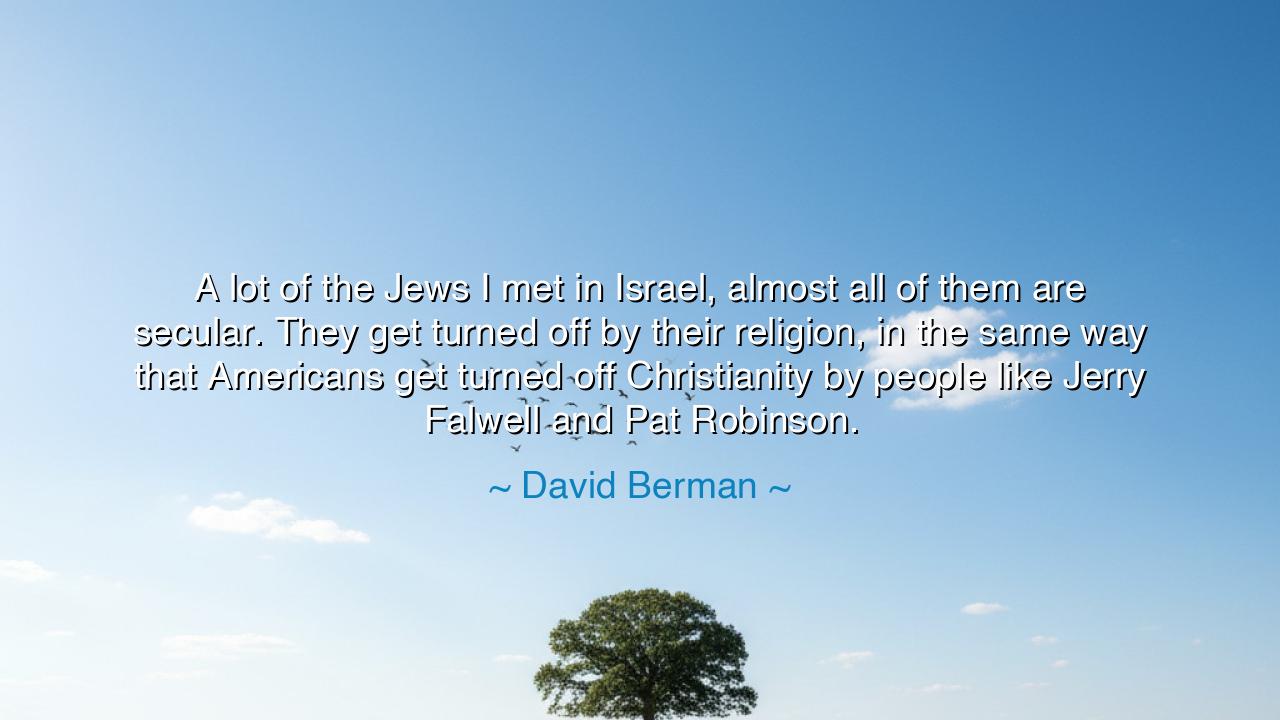
A lot of the Jews I met in Israel, almost all of them are
A lot of the Jews I met in Israel, almost all of them are secular. They get turned off by their religion, in the same way that Americans get turned off Christianity by people like Jerry Falwell and Pat Robinson.






David Berman, with the sharpness of a poet and the candor of one unafraid of truth, declared: “A lot of the Jews I met in Israel, almost all of them are secular. They get turned off by their religion, in the same way that Americans get turned off Christianity by people like Jerry Falwell and Pat Robinson.” In these words lies a piercing observation about the nature of faith and the danger of its distortion. He speaks of how men are not repelled by God Himself, nor by the essence of the sacred, but by the way religion is often wielded—narrowed, politicized, and bent into an instrument of judgment rather than a fountain of compassion.
The ancients knew this tension well. The prophets of Israel thundered against their own priests, declaring that burnt offerings and outward piety meant nothing if justice and mercy were forgotten. Likewise, Christ condemned the Pharisees who burdened the people with heavy laws but neglected the weightier matters of love and truth. Religion, when misused, becomes not a door to the divine, but a stumbling block; not a refuge for the weary, but a wall of division. Berman’s words are thus a lament: that in Israel, as in America, many turn away not because the holy is false, but because its representatives often betray it.
Consider the story of Martin Luther, who in the sixteenth century saw the corruption of his Church—indulgences sold for gold, truth exchanged for power. His protest was not against God, nor even against faith, but against those who had twisted faith into chains. From this came the Reformation, which sought to restore the heart of religion to sincerity. His struggle mirrors Berman’s insight: that when leaders of faith turn religion into spectacle or weapon, the people often flee, leaving behind the very truths that might have given them life.
And yet, O listener, do not despair. For even among the secular, the spirit of faith often lingers. Those who turn away from religion because of its distortions still carry within them a longing for justice, for meaning, for transcendence. Many who reject the institution still embrace the essence—compassion, love, and conscience. The challenge of every generation is to see beyond the failures of men to the eternal truths that lie beneath. For the sacred is not destroyed by hypocrisy; it is only hidden.
Berman’s comparison between Israel and America teaches us this: that all peoples, whether Jew or Christian, are vulnerable to the same danger—that when faith is bound too tightly to politics or to harshness of spirit, it ceases to inspire and begins to repel. But when it is lived with humility and mercy, it draws hearts like water draws the thirsty. Thus the choice is ever before us: to wield faith as a rod, or to share it as bread.
The lesson is clear: if you would preserve the heart of religion, live it with authenticity. Do not speak in thunder while your heart is hollow. Do not use the name of God to magnify your pride or secure your power. Instead, live gently, show kindness, and let your actions be your witness. In this way, you will not drive men away, but invite them to rediscover the beauty they thought lost.
Practical wisdom flows from this: judge not all faith by its loudest voices. Seek the quiet practitioners, the humble servants, the ones who heal rather than condemn. And if you yourself walk in faith, be mindful that your words and deeds may either turn others away or draw them closer. To embody mercy is the greatest sermon; to live truth is the highest prayer.
So remember this, O children of tomorrow: many turn away from religion, but few truly turn away from the hunger for the divine. Do not let the failures of men rob you of the treasures of eternity. Look past the noise of false prophets and self-appointed judges, and seek instead the living stream of love, justice, and truth. For that is the heart of faith, the part that never repels but only renews, the part that no corruption can ever extinguish.






AAdministratorAdministrator
Welcome, honored guests. Please leave a comment, we will respond soon